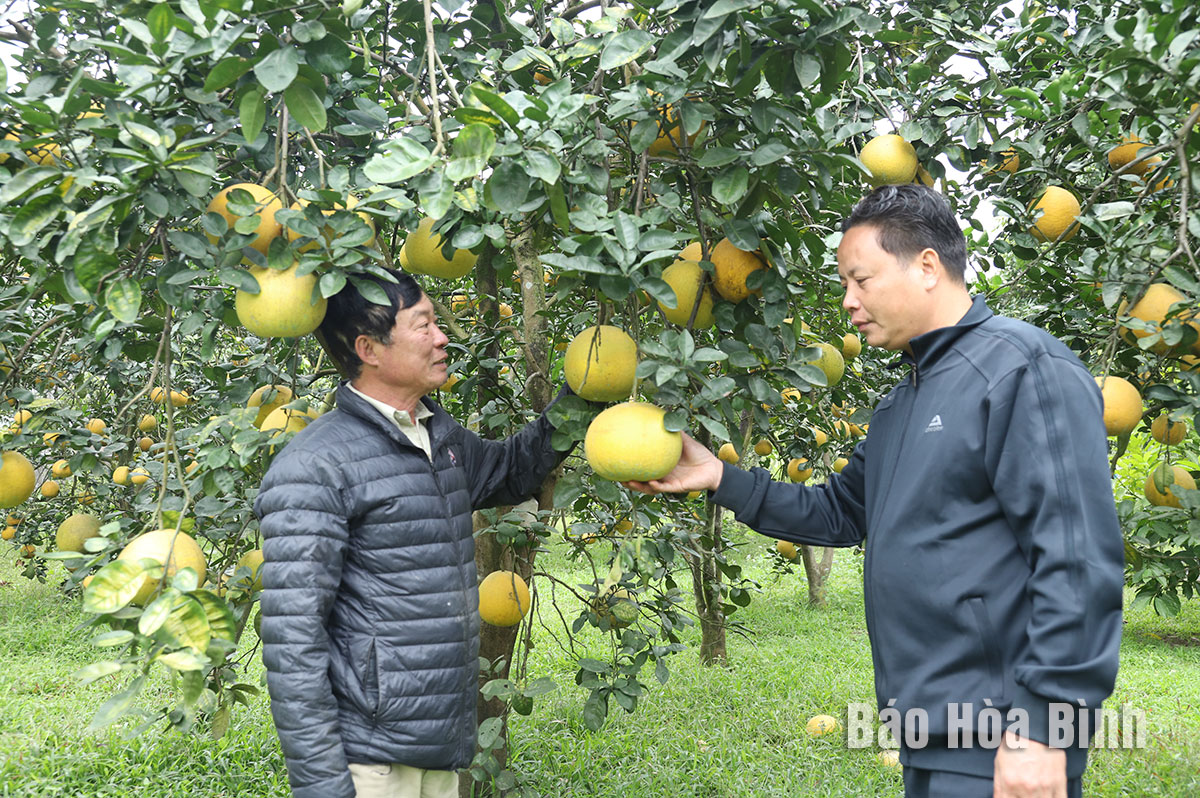
Coming to Khuoc hamlet, Cao Son commune (Luong Son), on the days just before Tet, visitors can immerse themselves in the joyful and exciting atmosphere to welcome the new year of local people. In recent years, the hamlet has been given a facelift. To date, the average per capita income has reached 41 million VND (1,680 USD) a year, the rate of poor households has decreased to 0.9%, and locals’ lives have improved continuously. Few people know that Khuoc used to be one of the 36 most difficult hamlets in Hoa Binh province.

Bui Van Thao (left), Khuoc hamlet,
Cao Son commune (Luong Son) shares his experience in developing citrus growing
model.
Nguyen Huu Mung, Secretary of Khuoc
hamlet's party cell, recalled the time before 2019 when there were no roads and
it would take nearly two hours to go from the hamlet to the commune's office.
Inconvenient roads made people's lives difficult. Transporting goods was mainly
by rudimentary methods; locals had to stock up food for the whole week. From
the State's support capital, in the 2017 – 2018 period, inter-hamlet roads were
built, thus helping change the hamlet’s appearance. New economic models such as
growing citrus and forestry trees have been implemented.
The hamlet currently has 54 households with
223 members belonging to the two ethnic groups of Muong and Dao. In 2012, the
poverty rate was over 70%.
Benefiting from essential infrastructure
projects invested in and built by the State, many local households have
implemented economic models suitable to local climate and soil conditions.
According to statistics, the area of citrus trees in the locality has expanded
by nearly 20 hectares. Some key varieties bring high economic efficiency such
as orange V2, green-skinned pomelo, Dien pomelo and longan. In addition, some
households have focused on planting and exploiting production forests with a
total area of over 30 hectares. Agricultural products are purchased by traders
after harvest.
From support resources of the State, the
local party committee and authorities have effectively taken advantage of
integrated programmes and projects to invest in upgrading essential
infrastructure systems. To date, roads in the hamlet have basically been built,
100% of people have gained access to safe water and electricity, and over 85%
of households have been recognised as "cultural families". Political
security and social order and safety have been maintained.
Bui Minh Chau, Vice Chairperson of the
People's Committee of Cao Son commune, said that thanks to the support of the
Party and State, the lives of people in Khuoc hamlet have changed for the
bettter. In the coming time, the local party committee and authorities will
mobilise maximum resources to continue investing in upgrading essential
infrastructure systems, assisting locals in changing the structure of crops and
livestock to suit the actual conditions at the grassroots. The hamlet is
striving to raise per capita income to over 43 million VND this year.
The Department of Education and Training of Hoa Binh province held a conference on March 18 to review the performance of the "Safe and Happy School" Project and set out tasks for 2025. The project, funded by the Taiwan Fund for Children and Families (TFCF), aims to create a safe, inclusive, and supportive learning environment for students. The event saw the attendance of representatives from the TFCF and 26 beneficiary schools.
With over 70% of their workers being women, trade unions across industrial parks (IPs) in Hoa Binh have been actively safeguarding their legal rights and interests while implementing initiatives to improve their income and well-being.
In recent years, the Hoa Binh provincial General Hospital has continuously innovated itself and improved the quality of medical services to meet the increasing needs of local people. With substantial investments in infrastructure and modern equipment, along with a team of highly qualified doctors and nurses, the hospital has gradually established itself as one of the leading medical units in the Northwestern region and a trusted destination for healthcare for people inside and outside the province.
From mastering the fundamentals of programming to achieving national recognition, the Programming Club of the Le Van Tam Primary School (STAR LVT28) in Hoa Binh city has made remarkable strides in the field of robotics.
The Ho Chi Minh Communist Youth Union Committee and the Vietnam Youth Federation chapter of Hoa Binh province organised a programme on March 12 to launch the "Digital Literacy" movement and an online quiz on the resolutions of the Vietnam Youth Federation congresses at all levels, as well as the Politburo's Resolution No. 57-NQ/TW on breakthroughs in the development of science, technology, innovation, and national digital transformation.
As climate change grows more unpredictable, the development of production forests has become essential - not just for economic growth, but for safeguarding the environment and maintaining ecosystem balance. By boosting local incomes, curbing natural disasters, preventing soil erosion, and protecting water resources, these forests play a crucial role in sustainable development.



